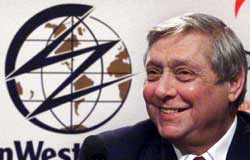
Israel Asper
 Israel Asper
| |
|
Ha'aratz
18 July 2002 Coming Home By Neri Livneh
Batya Mendel, who until two months ago was a Peruvian citizen whose first name was Blanca, analyzes the situation with surprising passion and self-confidence: "Yasser Arafat isn't even a Palestinian and he has no rights to the Land of Israel because he wasn't born in the Land of Israel. This land was promised eternally by God only to those who were born here. Just because I was born in Peru and don't have Jewish roots makes no difference, because the Book of Zephania states that those who want to believe in the Holy One and be believing Jews � only they have rights to the Land of Israel. Maybe, when the Messiah comes and all the Palestinians are converted to Judaism and believe in God with complete faith, only then will we allow them to live in the Land of Israel." Almost unnoticed, a new branch of Jews is springing up in the settlements, Jews who are connected to Israel and all things Israeli by a very narrow bridge indeed. They have yet to visit Tel Aviv or Haifa, and they have never even heard of Degania, the very first kibbutz, or its neighbor, Kinneret. Miki Kratsman, the photographer, and I had the privilege of being the first secular Jews they ever met. Nevertheless, they feel as deeply rooted and authentic as that composer of quintessentially Israeli songs, Naomi Shemer. They are fired with a historic sense of their right to this land, as though they were the Zinati family from Peki'in, the ancient Jewish town in Galilee. "We are of Indian origin," says Nachshon Ben-Haim, formerly Pedro Mendosa, "but in Peru, in the Andes, there is no Indian culture left. Everyone has become Christian, and before we became Jews, we also were Christians who went to church." [...] Theoretically, the new Jews had the option of joining the Jewish community in Peru, but that was ruled out. "How can I put it without hurting anyone?" [Rabbi Eliyahu] Birnbaum says. "The community in Lima consists of a certain socioeconomic class and did not want them because they are from a lower level. There was a kind of agreement that if they were converted, they would not join the Lima community, so there was no choice but to lay down the condition that they immigrate to Israel." [...] Mendel's [Blanca's] eyes glitter as she talks about that future day: "It will be the most wonderful day in the world when all the Arabs will become Jews and observe the commandments and love the Lord and when the Messiah comes, there will be no one in the land of our fathers who does not love the Lord and Judaism with all their heart. "It was a shock for me to discover that there are nonreligious Jews in Israel. You are blind and do not see the wellspring we have in our hands which is the Torah. Your mouths are sealed and you cannot drink from the well, and your eyes are blind and you do not see, and your ears are sealed and you do not want to hear. I pray to God that you will all become religious for the good of the state, because the Torah has preserved us as a people for all the years from the time of the patriarch, Abraham, and because of the Torah, we have a right to live here and the Arabs do not." You only became a member of this nation a few months ago, and you have been in the country less than two months. Do you know that there are Arabs whose families have lived here for hundreds of years? "But God said that whosoever becomes a Jew with a full heart and observes the commandments � only to a Jew like that will He give the land for generation unto generation." Ben-Haim [Pedro Mendosa] is not bothered by the fact that by being sent to a settlement, he has also been effectively recruited to a particular political group: "We knew we were coming to a place that is called 'territories' because people we know immigrated earlier and are living in the settlements in the territories. But I have no problem with that because I do not consider the territories to be occupied territories. You cannot conquer what has in any case belonged to you since the time of the patriarch, Abraham." In Trujillo, he worked as a cab driver and in commerce. "Most of our people did work like that, so we would have time for our prayers and commandments and holidays," he explains. Mendel [Blanca] and her husband also engaged in commerce. They are not bothered in the least by the employment situation in Israel. God will help them find work, Mendel [Blanca] says. Ben-Haim [Pedro Mendosa] says that after he finishes the Hebrew course, he may join the army, "because I wasn't in the army in Peru and that is something I lack, and also because I want to defend the country and if there is no choice, I will kill Arabs. But I am sure that Jews kill Arabs only for self-defense and justice, but Arabs do it because they like to kill." He bases this belief on his scientific view of Judaism: "The Arab has the instinct of murder and killing like all gentiles, and only Jews do not have that instinct � that is a genetic fact." But if you were not born a Jew genetically, don't you have that instinct? Ben-Haim [Pedro Mendosa]: "Maybe it was there, but it makes no difference, because now we are all Jews." Reprinted by the Jewish Agency For Israel at www.jafi.org.il/papers/2002/july/harjuly18.htm and also by The Middle East Dialogue at middleeastdialogue.org/200207t/Indian_converts.html | ||||